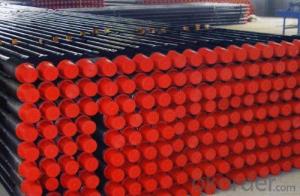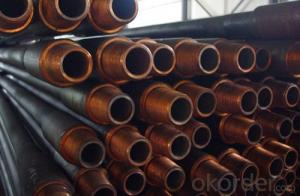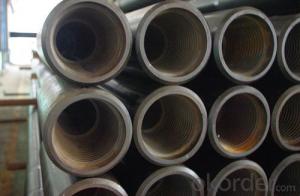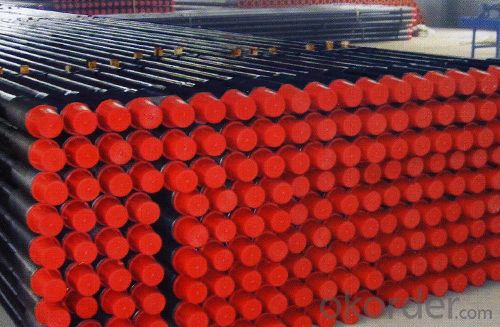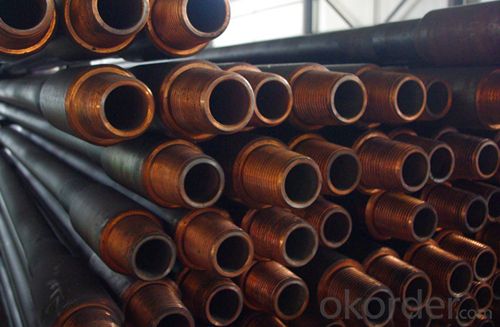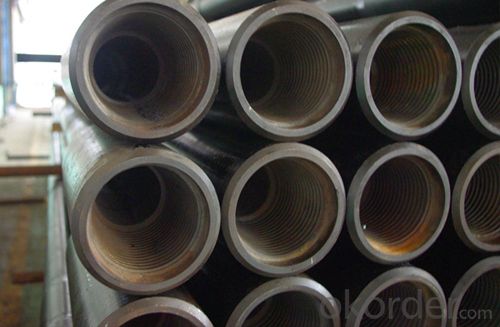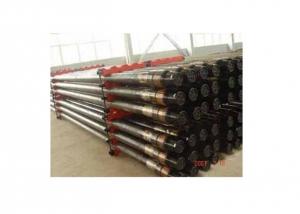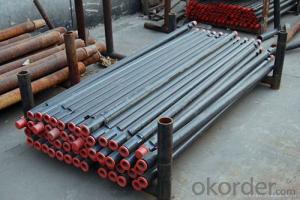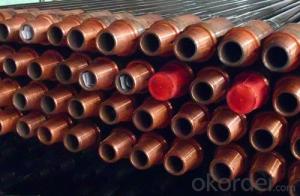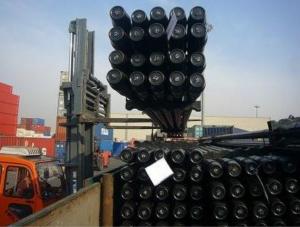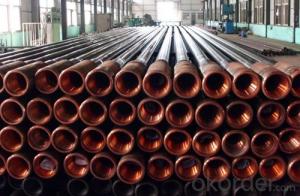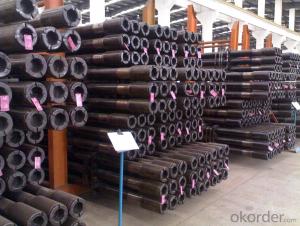Geological Drill Pipe with API Spec 5DP Standard
- Loading Port:
- Tianjin
- Payment Terms:
- TT OR LC
- Min Order Qty:
- 1 m.t.
- Supply Capability:
- 1000 m.t./month
OKorder Service Pledge
OKorder Financial Service
You Might Also Like
1. Structure of Geological Drill Pipe Description
We can supply all kinds of drill pipes that are consistent with API SPEC 5DP. Advanced drill pipe production lines can transfer the welding parameters to the best position to ensure the quality of welding zone; the heat treatment process with the feature of internal and external cooling at the same time can make a more reliable and stable mechanical character. Application of automatic weight, length measurement and automatic spray records can ensure products' traceability. Application of thickening and heating lines and 1250 tons of upsetting machine can ensure the thickening size meet the standard of API SPEC 5DR Using of CN furnace for whole pipe body heating and quenching, tempering machine's advanced heat treatment process can ensure the pipe's mechanical character. Tube hydraulic straightening machine ensures the straightness and coaxiality of pipe body.
Geological drill pipe is applicable for geographical, hydrographical, coal mining, terrestrial heat and engineering drilling. The major technical indexes of these seamless steel pipes are in compliance with international standard strictly.
The pipe materials for geographic drills have strict demands in term of sizes, forms, weights, technical specifications, test methods, test regulations, packing, marking and quality certificates. The seamless steel pipes used for geographic drills, which are produced by our company all adopt the original ex-factory identifications. If the contract says that goods should be delivered in terms of steel grades, then the identifications and quality certificates of the steel pipes should be indicated with steel grades.
2. Main Features of Geological Drill Pipe
1) Advanced test for quality
2) MTC provided
3) API Standard
3. Geological Drill Pipe Images
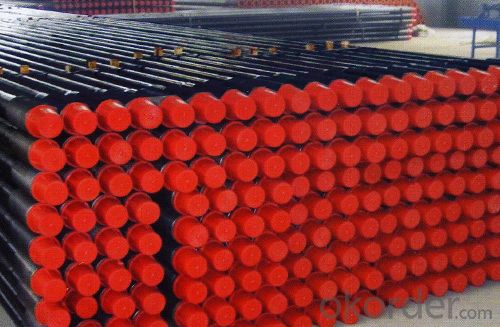
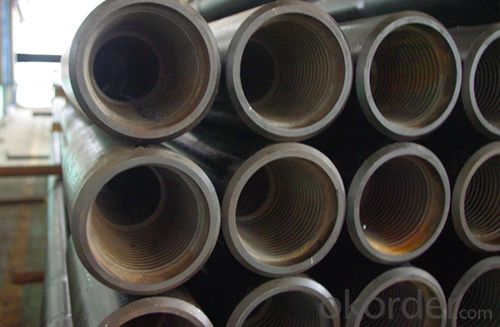
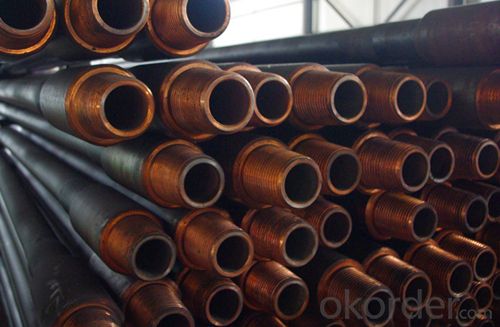
4. Geological Drill Pipe Specification
The main products include: Φ42, Φ50, Φ60, Φ63.5. The steel grades of drill pipes currently on the market are DZ40, DZ50, DZ60 and R780.
5. FAQ of Geological Drill Pipe
We have organized several common questions for our clients,may help you sincerely:
①How about your company?
One of the leading manufacturers and suppliers specializing in drill pipe products in China, mainly offering drill pipes including oil drill pipe, water well drill pipe, flat drill pipe, geological drill pipe and non-dig drill pipe.
Other than drill pipes we are also capable of supplying a wide variety of pipeline accessories, drill joints, steel pipe fittings, valves etc. consists of our one-stop sales. The integrated sales & service ensures customers with various demands an easier access for purchasing management.
②How to guarantee the quality of the products?
We have established the international advanced quality management system,every link from raw material to final product we have strict quality test;We resolutely put an end to unqualified products flowing into the market. At the same time, we will provide necessary follow-up service assurance.
③How long can we receive the product after purchase?
In the purchase of product within three working days, We will arrange the factory delivery as soon as possible.
- Q: How are steel pipes tested for leakage?
- Steel pipes are tested for leakage using various methods, including hydrostatic testing, pneumatic testing, and ultrasonic testing. Hydrostatic testing involves filling the pipe with water or another liquid and subjecting it to high pressure to check for any leaks. Pneumatic testing, on the other hand, involves pressurizing the pipe with air or gas to detect any leakage. Ultrasonic testing utilizes sound waves to identify any defects or leaks in the pipe by measuring the time it takes for the sound waves to bounce back. These testing methods ensure that steel pipes meet the required standards and are free from any leakage.
- Q: Can steel pipes be used for underground pressure pipelines?
- Yes, steel pipes can be used for underground pressure pipelines. Steel pipes are known for their strength and durability, making them suitable for various applications, including underground pressure pipelines. They can withstand high pressure and are resistant to corrosion, making them a reliable choice for transporting fluids or gases underground. Additionally, steel pipes are available in different sizes and thicknesses, allowing for customization based on the specific requirements of the pipeline project. However, it is important to ensure proper coating or lining of the steel pipes to prevent corrosion caused by soil conditions or the transported substance. Regular maintenance and inspections are also necessary to ensure the integrity and longevity of the underground pressure pipelines made of steel pipes.
- Q: Heating system DN40 and DN32 welded steel pipe how to connect?
- Welding: AC arc welding machine welding. Mode 1: apply to the medium of non demanding piping, DN40 steel pipe necking and DN32 steel pipe butt welding, or directly DN32 steel pipe into the DN40 internal welding. 2: the pipeline requirements apply to the inner wall of smooth transition, reducing short circuit welding for DN40x32 suppression of this mechanism are used for connection pipe seamless steel pipe high pressure pipeline connection, no special requirements, not commonly used welded steel pipe. Connection of mechanism fittings is not only costly, but not necessary unless special requirements are required!
- Q: How are steel pipes used in the manufacturing of agricultural machinery?
- Steel pipes are commonly used in the manufacturing of agricultural machinery for various purposes such as structural support, fluid transportation, and protection. They are utilized to create the framework and chassis of the machinery, providing strength and durability. Steel pipes are also used to transport fluids such as fuel, water, and chemicals throughout the machinery. Additionally, steel pipes can be used to protect vulnerable components from external elements, ensuring the longevity and reliability of the agricultural machinery.
- Q: What are the main types of steel pipe ah? How to judge which kind of steel pipe performance is better?
- Sort by connectionThe connection way of steel pipe can be divided into: light pipe (pipe end without thread) and wire tube (Guan Duan with thread).The tube can be divided into ordinary tube and end tube.Thickening of the tube can also be divided into: extra thick (with external thread), internal thickening (with internal thread) and inside and outside thickening (with internal and external thread) and other vehicle wire tube.The wire tube can also be divided into ordinary cylinder or taper thread and special thread.In addition, according to user needs, wire tubes are generally equipped with pipe delivery.Plating characteristicsAccording to the characteristics of surface coated steel pipe can be divided into: Clarinet (not coated) and coating tube.The coating tubes include galvanized pipes, aluminium plated tubes, chrome plated pipes, aluminized tubes and other alloy layers.The coating tube has an outer coating tube, an inner coating tube and an inner and outer coating pipe. The commonly used coatings are plastics, epoxy resins, coal tar, epoxy resins, and various glass based anticorrosive coatings. Galvanized pipe is divided into KBG pipe, JDG pipe, threaded pipe, etc.
- Q: How do steel pipes handle abrasive materials?
- Steel pipes are highly durable and resistant to abrasion, making them well-suited to handle abrasive materials. The smooth interior surface of steel pipes minimizes friction and wear caused by the movement of such materials, ensuring their efficient and effective transportation.
- Q: What are the different standards and specifications for steel pipes?
- There are several different standards and specifications for steel pipes, including ASTM (American Society for Testing and Materials), API (American Petroleum Institute), and ANSI (American National Standards Institute). These standards outline the requirements for various aspects of steel pipes such as dimensions, material composition, mechanical properties, and testing methods. Additionally, there are specific standards for different applications, such as oil and gas pipelines, structural pipes, and water supply systems, which further define the specifications and performance criteria for steel pipes.
- Q: What is the role of steel pipes in the transportation of petroleum products?
- Steel pipes have a crucial function in the transportation of petroleum products, as they are specifically designed to endure the high pressure and extreme temperatures associated with oil and gas transportation. A primary responsibility of steel pipes in this process is to serve as a dependable and secure conduit for transporting petroleum products over long distances. They are utilized to construct pipelines that span hundreds or even thousands of miles, connecting oil fields, refineries, and distribution centers. Steel pipes are the preferred choice for this purpose because of their strength, durability, and resistance to corrosion. The high tensile strength of steel allows these pipes to withstand the immense pressure exerted by petroleum products as they flow through the pipelines. Additionally, steel pipes can endure extreme temperatures, ensuring the safe transportation of hot crude oil or refined petroleum products. Moreover, steel pipes possess a high resistance to corrosion, which is of utmost importance given the corrosive nature of petroleum products. To further enhance their corrosion resistance, the pipes are often coated with protective materials such as epoxy or polyethylene. This coating helps prevent leaks or ruptures that could cause environmental damage or safety hazards. Steel pipes also offer cost-effective and efficient transportation of petroleum products. They have a smooth interior surface, which reduces friction and allows for a more efficient flow of oil or gas. This, in turn, helps minimize energy consumption and maximize the throughput of the pipeline system. In conclusion, the main role of steel pipes in the transportation of petroleum products is to provide a reliable, secure, and efficient means of transporting oil and gas over long distances. They are designed to withstand high pressure, extreme temperatures, and corrosion, ensuring the safe and efficient delivery of petroleum products from production sites to refineries and distribution centers.
- Q: Can steel pipes be used for high-temperature applications?
- Yes, steel pipes can be used for high-temperature applications. Steel is a durable and robust material that can withstand high temperatures without deformation or structural failure. It has excellent heat resistance properties, making it suitable for various industrial processes, such as steam lines, power plants, and oil refineries, where high temperatures are involved. The use of specifically designed high-temperature steel alloys further enhances their performance in extreme heat conditions.
- Q: Can steel pipes be used for gas transmission pipelines?
- Yes, steel pipes can be used for gas transmission pipelines. Steel is a commonly used material for gas pipelines due to its strength, durability, and ability to withstand high pressure and extreme temperatures. It is resistant to corrosion and can effectively transport natural gas or other gases over long distances. Additionally, steel pipes can be welded together to create a continuous and leak-proof pipeline, ensuring the safe and efficient transmission of gas.
Send your message to us
Geological Drill Pipe with API Spec 5DP Standard
- Loading Port:
- Tianjin
- Payment Terms:
- TT OR LC
- Min Order Qty:
- 1 m.t.
- Supply Capability:
- 1000 m.t./month
OKorder Service Pledge
OKorder Financial Service
Similar products
Hot products
Hot Searches
Related keywords
